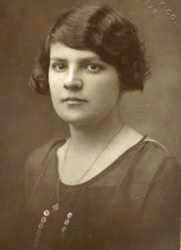Carmen Clemente Travieso facts for kids
Carmen Clemente Travieso (1900–1983) was a Venezuelan journalist and a strong supporter of women's rights. She was the first woman to graduate as a reporter from the Central University of Venezuela. She was also one of the first women to work as a full-time journalist in her country. Carmen was among the first women to join the Communist Party of Venezuela. She worked hard to help women gain the right to vote. She also helped start an organization that wanted to improve prisons. Carmen was a co-founder of the Venezuelan Association of Journalists.
Biography
Carmen Clemente Travieso was born in Caracas, Venezuela, on July 24, 1900. Her father passed away when she was young. She grew up with her four siblings at her grandmother's house.
When she was 17, Carmen went to New York City with her aunt. There, she learned English and worked in a factory. She also started to get involved in women's rights. She became an activist, helping people who had leprosy.
Carmen returned to Caracas in 1927. She became involved with a student movement that wanted to remove the dictator Juan Vicente Gómez. While working in a library, she joined a group called "Madrinas de Guerra." These women brought food and medicine to students and prisoners during the conflict.
She also became friends with Juan Bautista Fuenmayor, Kotepa Delgado, and Rodolfo Quintero. They started the Communist Party of Venezuela. Carmen helped them create a study center to share their ideas. A year later, she organized the first effort to allow women to join the party. In 1932, she began writing for an underground newspaper called El Martillo. She continued to write for it until 1941.
Carmen became the first woman reporter to graduate from the Central University of Venezuela (UCV). In 1936, she joined the Women's Cultural Association. She wrote articles in newspapers like Ahora and El Nacional. Her articles were about unfair laws and the need for laws to protect children. She led this organization for ten years. She also directed its journal, La Cultura de la Mujer.
Throughout the 1930s, Carmen wrote about many social issues. She wrote about hygiene, homeless children, and women's lack of rights. In 1937, she helped start the National League in Support of Prisoners. This group worked to improve prisons.
In 1940, Carmen helped organize the First National Women's Conference. This meeting aimed to change laws so women could have equal legal and political rights. The next year, she helped found the Venezuelan Association of Journalists. In 1945, she held meetings at her home for a second women's congress. They were working to get women the right to vote.
They gained support from President Isaías Medina Angarita. However, a coup d'état (a sudden takeover of the government) removed him from power. Carmen was chosen as the Communist party's candidate for the 1946 constitutional convention. In 1947, this convention granted suffrage (the right to vote) to all citizens over 18. Some women felt their work was done. But Carmen believed that civil and economic legal changes were still needed.
In 1950, the Communist party was made illegal after another coup. Carmen published a book called Mujeres venezolanas y otros reportajes (Venezuelan Women and other reportings). This book strongly spoke about the unfair treatment of women's rights. The next year, she joined the resistance against the dictatorship. She held secret meetings in her home.
She continued to publish her writings. In 1953, she released a biography of Teresa Carreño. Carmen was questioned in 1957 during continued political unrest. But the next year, after a long period of censorship, she and other journalists could write for newspapers again. These newspapers had been banned for many years. She kept publishing her work until the 1970s. Carmen Clemente Travieso passed away on January 24, 1983, in Caracas.
Selected works
- Luisa Cáceres de Arismendi (ensayo biográfico) (1942)
- Mujeres venezolanas y otros reportajes (1951)
- Teresa Carreño, 1853–1917; ensayo biográfico (1953)
- Las esquinas de Caracas: sus leyendas, sus recuerdos (1956)
- Las luchas de la mujer venezolana (1961)
- Mujeres de la independencia. (Seis biografías de mujeres venezolanas) (1964)
- Anécdotas y legendas de la vieja Caracas (1971)
- Las mujeres en el pasado y en el presente (1977)
See also
 In Spanish: Carmen Clemente Travieso para niños
In Spanish: Carmen Clemente Travieso para niños


